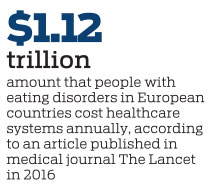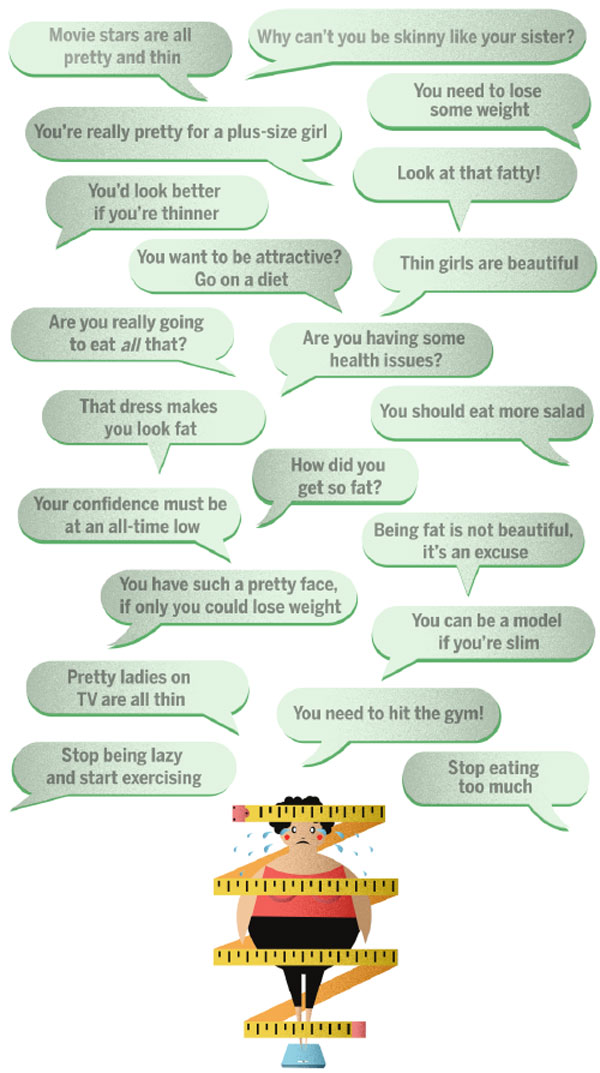BODY SHAPE WEIGHS HEAVILY ON WOMEN
Topic an obsession in China and the West
On a warm spring after-noon, 28-year-old Ye Xiaoxian keeps her eyes glued to her computer screen as she chats with female co-workers in an office in Hangzhou, Zhejiang province.
Her concentration is only broken when a colleague offers a plate of snacks.
"I've already eaten a chicken drumstick, three pieces of turkey bacon, a handful of potato chips, half a bowl of white rice and some walnuts. My thighs will swell if I eat these snacks," Ye said, reluctantly pushing the plate away.
Her colleague, pinching Ye lightly on the forearm, replied: "Come on, you are not fat at all. I am the elephant in the room."

But Ye, popping a slice of pineapple into her mouth, responded, "No, I don't even feel like eating dinner tonight and I really should renew my gym membership."
Fretting about weight has become a common topic for discussion among Chinese women - and not just at the office. Such discussions can be heard everywhere, from high school classrooms to fitness studios, beauty salons and department stores.
But the issue is not just cause for concern in China. Obsessing over body shape has also emerged in Western countries over the past decade.
The term "fat talk" was coined by United States anthropologist Mimi Nichter and her team of researchers in 1994 after they observed the way girls in middle school spoke about their body shapes - unexpectedly revealing that they invariably focused on the negatives.
Since then, numerous studies have detailed how pervasive "fat talk" has become among women of all ages.
A study published in the Psychology of Women Quarterly in 2011 found that an "overwhelming majority of women" - 93 percent - admitted to discussing the issue, with one-third of them doing so frequently.
While it is reasonable to assume that women most concerned with their body shape are those who might be susceptible to obesity or other risks, studies indicate the vast majority of women who engage in "fat talk" can be ranked "average" and "healthy" when it comes to their weight.

Zhang Ran, 28, a senior consultant in the Beijing office of multinational professional services company Ernst& Young, said she was a "fat talker" when she was a college student.
"I felt comfortable when I discovered I was not the only one who was unhappy about my body shape. But then I began to understand that it has nothing to do with a woman's actual weight, but everything to do with how she sees herself," she said.
She added that sharing her fear of being fat with others could trigger feelings of emotional security and being part of a greater community. Even after she graduated and started a career, "fat talk" - and its related effects - did not stop.
"A woman gets it into her head that she can never be too thin," she said.
Zhang Xin, associate professor at the School of Psychological and Cognitive Science at Peking University in Beijing, believes "fat talk" may be a way of expressing that "we all share feelings of insecurity".
"Women are more likely than men to enjoy chatting with their peers about weight concerns and body issues, and this may release them from pressure over their weight and serve as a way to bond with their friends," he said.
But "fat talk" is a double-edged sword. While it may seem a harmless way to ease dissatisfaction over body shape by gaining reassurance within a peer group, it can also serve to reinforce negative feelings.
Rarely achieved
In China, "fat" has become a word that women will do almost anything to avoid being associated with. This is not surprising, given that being slim as a beauty ideal has become the subject of countless newspaper stories, TV commercials and movies, resulting in the almost universal correlation between a slim figure and beauty.
Pan Wenjing, an assistant professor in communication at Renmin University of China, said: "Women are bombarded with images of female celebrities on TV who are almost always well below average weight, which can rarely be achieved in real life. Once they accept this 'thin idea' of ideal beauty, they tend to become much more self-critical about their bodies."
For most Chinese women who spend five hours a day on average on their smartphones, social media platforms have provided outlets for them to discuss body weight.
With a huge number of images available of super-thin actresses and models, women have been focusing attention on a "problem" that is only in their minds.
This trend was underlined in 2016 when scores of women shared photos on Sina Weibo to prove that their waists did not protrude from behind an A4-sized sheet of paper - a "standard" they believed to be the norm.
A man giving his name as Million Zhao, who has nearly 800,000 followers on Sina Weibo and works as a part-time commercial photographer, said that virtually all his female clients ask him to alter their pictures digitally to make them appear skinnier before they are posted online - even those who are already super-thin.
The 30-year-old also engages in "fat talk" with his friends, and sometimes jokes about his rotund belly to his followers on Sina Weibo.
He said, "Different from women, guys my age or younger engage more in 'muscle talk' because they want to be bigger and stronger", while many middle-aged men who have gained weight get caught up in "fat talk", as they "want to lose weight and be heathier rather than prettier."
Denise Martz, a professor of psychology at Appalachian State University in North Carolina, US, said, "Social media is giving women a false sense of how they usually look.
"Often these pictures do not represent how these individuals look in real life without the posing, the filters, the photoshopping and the professional hair and make-up," Martz said.
Pan, the Renmin University researcher, also believes that pictures shared frequently on social media impose peer pressure on women.
"If people around you look thin on WeChat Moments, you are inevitably anxious to fit the general profile of having the 'right look'," she said.
Articles have also gone viral in summer on WeChat Moments, with sensational headlines such as "Good-looking girls never weigh more than 50 kilograms" or "If you don't lose weight in May, you will cry out loud in June".
Shen Zijiao, a psychological consultant at Beijing Normal University, said: "Women don't know what kind of beauty is best for them; they just thumb through their phone screens and get the notions of 'being slender' consciously or unconsciously. They always worry if their bodies are inconsistent with the so-called perfect body shape."
Since women have "internalized the thin ideal" from social media, they develop a negative relationship with their bodies. This often leads them to engage in "fat talk" - resulting in much lower self-esteem, Shen added.
Ye, from Hangzhou, who works as an accountant for Silergy Corp, said more than 90 percent of her colleagues in the finance department are women, ranging in age from the early 20s to late 40s. Some have families, while others are single or just "jump into" romantic relations. But all of them have varying degrees of dissatisfaction with their body shape.
"Every woman in our office is unhappy with at least one part of her body. One of them might say her face is too round, while others are unhappy with their arms when we sit together and gossip," said Ye, who weighs 48 kg but frowns as she looks at the shape of her thighs.
"I have often thought I would be more attractive if my thighs were thinner," she said, adding that one of her colleagues had not eaten dinner for at least two years in order to stay slim.
However, Martz, the Appalachian State University professor, warned that excessive concern can aggravate an impression of poor body shape, cause anxiety and depression, and, more important, could pave the way to eating disorders in extreme cases.
According to the nonprofit US National Association of Anorexia Nervosa and Associated Disorders, at least 30 million US citizens of all ages, both male and female, have an eating disorder.
An article published in the medical journal The Lancet in 2016 said nearly 20 million people in European countries had eating disorders that cost healthcare systems more than 1 trillion euros ($1.12 trillion) annually.
This is also a growing problem in Asia, and such a trend could prompt the kind of initiatives that have been launched in some Western countries to encourage "body positivity" or ban misleading images and extremely thin models in advertising.
In addition, multinational companies such as Dove and Johnson & Johnson have introduced "body positive" campaigns in an effort to overturn fat-shaming stereotypes that have long been part of mass media advertising.
Sellout hit
Women themselves are also starting to embrace the diversity of beauty.
Kelli Jean Drinkwater, who describes herself as a "radical fat activist", co-directed a dance show, Nothing to Lose, with Kate Champion from the dance theater company Force Majeure. The show, which was an award-winning sellout hit at the 2015 Sydney Film Festival in Australia, focuses on overweight bodies in an artistic way, attempting to challenge stereotypes and reshape expectations.
In a speech posted online, Drinkwater said, "I've lost count of how many times people of all sizes have told me that the show has changed their lives, how it has helped them shift their relationship to their own and other people's bodies."
In China, a new trend embracing the diversity of beauty has also emerged recently.
Wang Ju, 25, a contestant on the popular singing show Produce 101, has become the country's latest female icon to reset beauty standards in an industry that has long praised women who are, for the most part, thin and white.
When Wang made her stage debut, she weighed 60 kg, which was considered too heavy for her 1.65-meter height. But she quickly gained popularity among young people, encouraging better self-acceptance among women and reversing a long-held traditional standard.
"The standard of being beautiful is to be yourself," Wang said in an interview with The Guardian. "I control my own life. Having an independent spirit is too important to compromise."
It looks as though Chinese women will continue to redefine beauty and try to be independent in today's ever-changing world.
According to a survey published by Dove in 2017, 80 percent of adult women and 70 percent of young girls in China want the media to highlight women's charm from more angles, not just by focusing on body shape.
Paying less attention to the appearance of women in advertising, movies and TV shows, and more attention to their words and deeds, is cited as the ultimate objective by the survey.
zhaoruinan@chinadaily.com.cn

(China Daily Global 05/13/2019 page2)


















